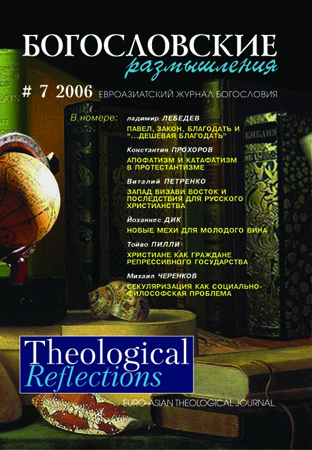Обучение - провал, или успех?
Keywords:
Богословское образование, учебный план, духовная жизнь студентовAbstract
Суть заключается в том, что, будучи ответственными преподавателями богословия, мы не можем воспринимать скрытый учебный план как статус%кво, который разрушает саму суть нашей цели. Сложная задача состоит в том, чтобы на сознательное планирование скрытого учебного плана тратить не меньше времени, чем на явный учебный план, и, в частности, стремиться к целостному многомерному подходу к обучению, который, единственно, может вывести нас на путь конструирования учебного плана на наивысшем качественном уровне.
References
- Banks, Robert. Reenvisioning Theological Education: Exploring a Missional Alternative to Current Models. Grand Rapids: Eerdmans, 1999
- Knowles, Malcolm S., Elwood F Holton III, Richard A. Swanson. The Adult Learner, 6th ed. Boston: Elsevier, Butterworth, Heinemann, 2005
- Kohn, Alfie. Punished by Rewards. Boston: Houghton Mifflin, 1999
- Meyers, Chet, and Thomas B. Jones. Promoting Active Learning: Strategies for the College Classroom. San Francisco: Jossey-Bass, 1993
- Palmer, Parker J. To Know as We Are Known: A Spirituality of Education. San Francisco: Harper & Row, 1983
- Palmer, Parker J. The Courage to Teach: Exploring the Inner Landscape of a Teacher’s Life. San Francisco: Jossey-Bass, 1998
- Richards, Lawrence O. A Theology of Christian Education. Grand Rapids: Zondervan, 1975.
- Schun, Donald A. The Reflective Practitioner: How Professionals Think in Action. Aldershot: Ashgate, 1991
- Wlodkowski, Raymond J. Enhancing Adult Motivation to Learn. Rev. Ed. San Francisco: Jossey-Bass, 1999
Downloads
How to Cite
Issue
Section
License
Copyright (c) 2020 Перри ШАУ

This work is licensed under a Creative Commons Attribution-NonCommercial 4.0 International License.
All articles published in the Journal are distributed under a Creative Commons Attribution-NonCommercial 4.0 International License
By submitting an article for publication in Theological Reflections: Eastern European Journal of Theology the author grants the editors the right to publish the article and distribute it in electronic and print form.
The author reserves all copyrights and the right to use the materials of the article in whole or in part for educational purposes, to write his own dissertations, to prepare abstracts, conference reports, oral presentations, etc., as well as post electronic copies of articles (including the final electronic version downloaded from the journal’s official website) on non-commercial web-resources without the consent of the editorial board and founders.



